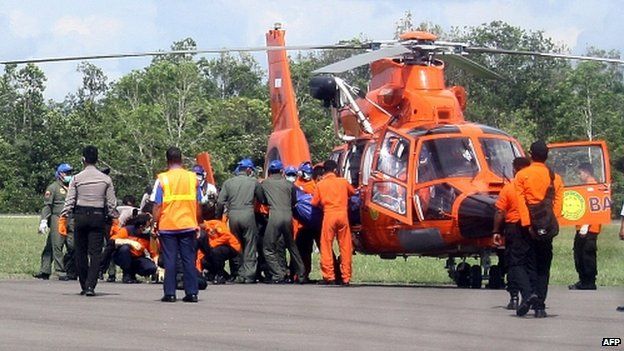AirAsia QZ8501: Fresh bid to raise fuselage fails
- Published

The Indonesian admiral in charge of operations to recover AirAsia flight QZ8501 has told the BBC the fuselage may be too fragile to be lifted.
Rear Admiral Widodo's comments came after a renewed attempt to raise the wreckage from seabed failed when it kept breaking into pieces.
Ropes around the fuselage snapped during an initial failed effort to raise it on Saturday.
The plane crashed into the Java Sea last month killing all 162 on board.
It was flying from Surabaya in Indonesia to Singapore.
Four bodies were recovered on Saturday, taking the total recovered to 69, with more thought to be inside.
A preliminary report on the crash is expected to be filed next week , although the full investigation will take months.
Rescuers have been using inflatable balloon bags capable of lifting up to 10 tonnes to raise the 13-metre long section of wreckage from the sea bed and onto a flat boat.
But on Saturday, with the wreckage seven metres (22ft) from the surface, strong currents and the sharp edges of the aircraft's emergency door cut the rope connecting a bag to the fuselage.
The sharp edges had to be padded with rubber material before another attempt could take place.
Divers entered the main section of the fuselage, which is at a depth of 30m, for the first time on Friday.
The wreckage includes parts of both of the wings of the Airbus.
It is believed the plane's cockpit may also be in the same area.
Poor weather and difficult sea conditions have hampered the salvage operation since the main section of the aircraft was found.
On Friday, Indonesian rescue agency official SB Supriyadi described the difficulties of the salvage: "The divers said it was dark inside, the seats where floating about and the wires were like a tangled yarn."
The plane's cockpit voice recorder and flight data recorder were found last week.
This week Transport Minister Ignasius Jonan told MPs that radar data had shown that the jet had climbed too fast - at a speed of 6,000ft (1,828m) a minute.
This caused the plane to stall, he said. When planes stall, their engines do not cut out but the wings no longer generate lift because there is not enough air passing over them, BBC transport correspondent Richard Westcott says.